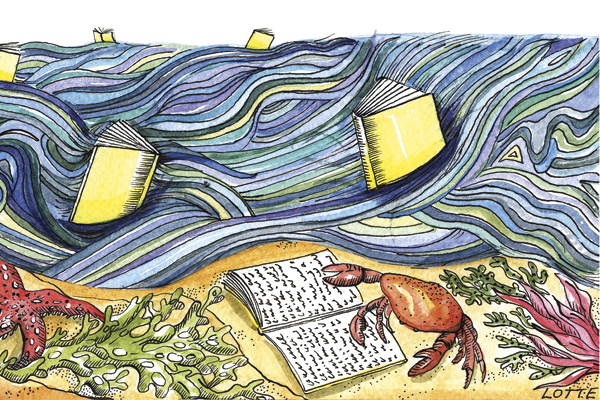On hearing that Easy Jet had changed its hand luggage allowance, two questions struck me. First, was the airline in league with the luggage makers’ guild? Second, which paperbacks would replace the hardbacks I was going to take with me to the beach?
Such considerations may strike you as ‘old world’, a bit last century. ‘Why not take your Kindle?’ you rightly ask. One answer is that I spend every waking hour reading words on a computer. Fire up the screen and get comfortable for a long read; well, I’m supposed to be doing just that rather than write this piece, which is little more than an excuse to fantasize about the holiday I’m about to take.
I was planning to read Glorious Misadventures by Owen Matthews, Silence: A Christian History by Diarmaid MacCulloch and as much disposable trash as I might grab at the airport. Yet my parsimonious, Easy Jet-flying, ways threatened this vision of anachronistic bliss. My new bag is a paperback only affair. There’s room for three books by my reckoning. Fortunately (or perhaps unfortunately in view of my predicament), there are some superb paperbacks in print. These have caught my eye over recent weeks and months:
Exposure by Michael Woodford. This book is in the mould of John Grisham, David Baldacci and Michael Connolly, with the added bonus that the story is true. Woodford was CEO of Olympus. He stumbled across a $1.7bn fraud. His colleagues closed ranks and got defensive. He lost his job and fled the country, fearing for his life. Then he wrote this explosive book. I skipped through this real thriller a couple of weeks ago. I’d like to re-read it with care. At 245 pages, it’s ideal for a day-read.
The Yips by Nicola Barker. This tale of a golfer in free fall was longlisted for the Booker last year. I can’t think why I didn’t even give it a look before it missed the cut for the Booker shortlist, especially as I enjoyed a vaguely similar book by American Chad Harbach, The Art of Fielding. Apparently, The Yips mixes a sporting tale with very subversive, even savage wit. I’ve heard a couple of respected fiction reviewers describe Barker as ‘the female Martin Amis’ (an unimaginable being in my view). At an imposing 548 pages, I suspect that this highly recommended novel will be well worth a proper shot.
The Spy Who Came in from the Cold by John Le Carré. It’s been many years since I read this early Le Carré ‘masterpiece’; but I did see the Richard Burton film adaptation not so long ago. I wonder how the two compare because Burton’s film left me cold in places. How could such a ponderous movie have been made out of only 288 pages of book? Penguin Modern Classics have published a 50th anniversary edition.
Selected Poems and Prose by Edward Thomas. It’s been nearly two years since I read Matthew Hollis’s beguiling, lyrical biography of Thomas, All Roads Lead to France, and I regret that my vow to read more of his subject’s work remains unfulfilled. I could put that right with the new 304 page edition published by Penguin World Classics, which contains an introduction by Robert Macfarlane.
Collected Ghost Stories by M.R. James. It’s been many years since I told myself to revisit M.R. James. To say that time has been a greater impediment than cowardice would be dishonest: I was unnerved by Casting the Runes to the extent that I couldn’t sleep after finishing it. Oxford World Classics’ new edition contains an appendix of James’s writings on the genre, which should be fascinating. However, it’s not out until 12th September.
Letters from Iceland by W.H. Auden and Louis MacNeice. If you fancy some poetry but Edward Thomas isn’t your bag, then how about this quirky collection of verse and other writings produced by these two masters after they travelled together in Iceland in 1936. I’ve not read it, but fancy I’d like it as something to dip into as one would the sea.
There are plenty of possibles among Penguin’s most recent catalogue. Ten Billion, by computational expert Stephen Emmott, considers the dangers of over-population. The Sleepwalkers by Christopher Clark is much the best of the new books I’ve seen about the prelude to the Great War. The World Until Yesterday by Jared Diamond got rave reviews – and I enjoyed JP O’Malley’s interview with Diamond in these pages. David Abulafia’s The Great Sea is one of the most accessible works of academic history I’ve ever read and I’m certain I’ll re-read it at some point. Yet even that is too recent or too familiar to tip my hand this time round.






Comments